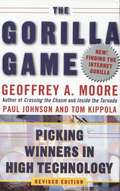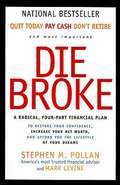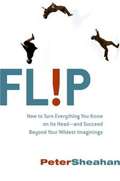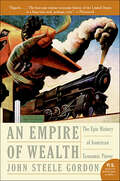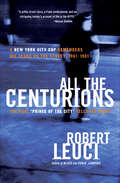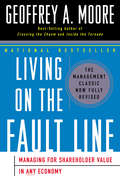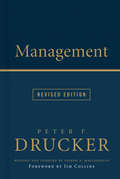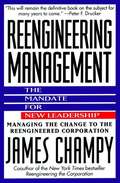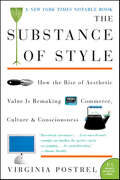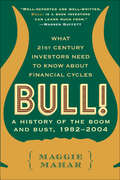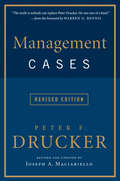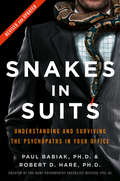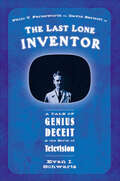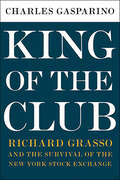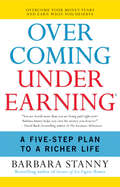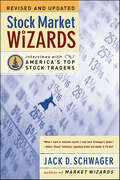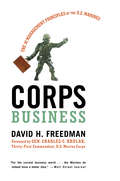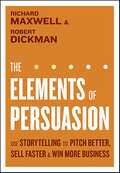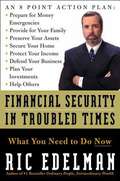- Table View
- List View
The Gorilla Gameition: Picking Winners in High Technology
by Geoffrey A. MooreThe Possibilities Are Staggering: Had you invested $10,000 in Cisco Systems back in early 1990, your investment would now be worth $3,650,000 Similarly, a $10,000 investment made in Microsoft in 1986 would be valued at more than $4,721,000 today $10,000 invested in Yahoo! in 1996 would today be worth $317,000 How do you get in on those deals-especially if you're not a Silicon Valley insider? How do you buy the high-tech win-ners and avoid the losers? How do you find the Yahoo!s, Microsofts, and Ciscos of tomorrow? The answers are here, in this newly revised edition of the national bestseller The Gorilla Game. The book reveals the dynamics driving the market for high-tech stocks and out-lines the forces that catapult a select number of compa-nies to "gorilla" status-dominating the markets they serve in the way that Yahoo! dominates internet portals, Microsoft dominates software operating systems, and Cisco dominates hardware for data networks. Follow the rules of The Gorilla Game and you will learn how to identify and invest in the "gorilla candidates" early on-while they are still fighting for dominance, and while their stocks are still cheap. When the dust clears and one company clearly attains leadership in its market, you'll reap the enormous returns that foresighted investors in high-tech companies deserve. This new edition of The Gorilla Game has been updated and revised throughout, with new focus and new insights into choosing the internet gorillas-the companies that are destined to dominate internet commerce. Bestselling author Geoffrey A. Moore is one of the world's leading consultants in high-tech marketing strategy. Here you'll find his groundbreaking ideas about tech-nology markets that made his previous books bestsellers, combined with the work of Paul Johnson, a top Wall Street technology analyst, and Tom Kippola, a high-tech consul-tant and highly successful private investor. Together they have discovered and played the gorilla game and now give readers the real rules for winning in the world of high-tech investing. Step by step you'll learn how to spot a high-tech market that is about to undergo rapid growth and development, how to identify and spread investments across the potential gorillas within the market, and how to narrow your investments to the single, emerging leader-the gorilla-as the market matures. High-tech investing can be extremely risky, but investors who learn to play the gorilla game can avoid many of the traps and pitfalls and instead start capitalizing on untold profits. Personal wealth is only a gorilla game away.
Die Broke
by Mark Levine Stephen PollanFrom America's most trusted financial advisor comes a comprehensive guide to a new and utterly sane financial choice. In Die Broke, you'll learn that life is a game where the loser gives his money to Uncle Sam at the end. There are four steps to the process: Quit TodayNo, don't tell your boss to shove it...at least not out loud. But in your head accept that from this day on you're a free agent whose number one workplace priority is your personal bottom line.Pay Cash You should be as conscious of spending as you are of saving. Credit should be a rarely used tool for those few times (buying homes and cars) when paying cash is impossible.Don't Retire Your work life should be a journey up and down hills, rather than a climb up a sheer cliff that ends with a jump into the abyss.Die Broke It sounds terrifying, the one intolerable outcome to your financial life. And yet, in truth, dying broke might be your best option for a life without fear: fear of failure and privation now, fear of impoverishment in the long run.
Flip
by Peter SheahanWhat do the superstars of modern business have in common? An ability to "flip"--to think counterintuitively and then act boldly, with no regard for "business as usual" conventions. one of the youngest and fastest-rising stars on the international consulting and speaking circuit, Peter Sheahan reveals how the world's most effective organizations and individuals distinguish themselves from the competition instead of running with the pack. Sheahan explores six major flips Action Creates Clarity--to move forward you must act in spite of ambiguity. Fast, Good, Cheap: Pick Three, Then Add Something Extra--the new standard in every industry. To develop competitive advantage, you must Absolutely, Positively Sweat the Small Stuff. Satisfy customers' needs for engagement and contact--it's not "just business"--Business Is Personal. To win mass-market success, be courageous, Find It on the Fringe, and separate yourself from the competitive herd. To Get Control, Give It Up--empower others to create, dream, and believe for you. Stick to what you learned in business school at your peril. Today's small-world economy calls for a new way of doing business. It calls for Flip.
An Empire of Wealth: The Epic History of American Economic Power
by John Steele Gordon“Superb . . . the best one-volume economic history of the United States in a long time and, perhaps, ever.” —NewsweekIn this illuminating history, John Steele Gordon tells the extraordinary story of the world’s first economic superpower. He shows how the American economy became not only the world’s largest, but also its most dynamic and innovative. Combining its English political inheritance with its diverse, ambitious population, the nation was able to develop more wealth for more and more people as it grew.Far from a guaranteed success, America’s economy suffered near constant adversity. It survived a profound recession after the Revolution, an unwise decision by Andrew Jackson that left the country without a central bank for nearly eighty years, and the disastrous Great Depression of the 1930s. Yet, having weathered those trials, the economy became vital enough to Americanize the world in recent decades. Virtually every major development in technology in the twentieth century originated in the United States, and as the products of those technologies traveled around the globe, the result was a subtle, peaceful, and pervasive spread of American culture and perspective.
All the Centurions: The Real "Prince of the City" Tells His Story
by Robert LeuciThe bestselling book and acclaimed film Prince of the City told only part of Robert Leuci's story. In All the Centurions, he shares the full account of his years as a narcotics detective with the New York Police Department -- a tale of daring adventure, shattered illusions, and finally, astonishing spiritual growth.Leuci reminisces about cops both celebrated and notorious, like Frank Serpico, Sonny Grosso, and Frank King from the French Connection case. Also here are politicians, Mafia figures, corrupt defense lawyers, and district attorneys, including a young Rudolph Giuliani. Leuci reveals the dark side of the criminal justice system: the bitterness, greed, cruelty, and ambition that eventually overflowed into the streets, precinct houses, and courtrooms of the city.As vivid and entertaining as the best crime novels, All the Centurions is the story of a man descending into a hell of his own making who ultimately finds his way out through truth and justice.
Living on the Fault Line,ition
by Geoffrey A. MooreThe fault line -- that dangerous, unstable seam in the economy where powerful innovations and savage competition meet and create market-shattering tremors. Every company lives on it; no manager can control it. In the original edition of Living on the Fault Line, Geoffrey Moore presented a compelling argument for using shareholder value (or share price) as the key driver in management decisions. Moore now revisits his argument in the post-Internet bubble world, proving that the methods he espouses are more germane than ever and showing companies how to use them to survive and thrive in today's demanding economy. Extending the themes of Crossing the Chasm and Inside the Tornado, his first two books on the dynamics of the high-tech markets, Moore shows why sensitivity to stock price is the single most important lever for managing in the future, both as a leading indicator of shifts in competitive advantage and as an employee motivator for making necessary changes in organizations heretofore impervious to change. This revised and updated edition includes: A deeper emphasis on core versus context, which has emerged as the key distinction in allocating resources to improve shareholder value A new Competitive Advantage Grid that will aid managers in achieving and sustaining competitive advantage, the most important component in managing for shareholder value An expanded Value Discipline Model as it relates to the Competitive Advantage Grid Analysis of the powerful new trend toward core/context analysis and outsourcing production duties Updated models of organizational change for each stage of market developmentAs disruptive forces continue to buffet the marketplace and rattle the staid practices of the past, Moore offers a brilliant set of navigational tools to help meet today's most compelling management challenges.
Living on the Fault Line
by Geoffrey A. MooreThe fault line -- that dangerous, unstable seam in the economy where powerful innovations and savage competition meet and create market-shattering tremors. Every company lives on it; no manager can control it. In the original edition of Living on the Fault Line, Geoffrey Moore presented a compelling argument for using shareholder value (or share price) as the key driver in management decisions. Moore now revisits his argument in the post-Internet bubble world, proving that the methods he espouses are more germane than ever and showing companies how to use them to survive and thrive in today's demanding economy. Extending the themes of Crossing the Chasm and Inside the Tornado, his first two books on the dynamics of the high-tech markets, Moore shows why sensitivity to stock price is the single most important lever for managing in the future, both as a leading indicator of shifts in competitive advantage and as an employee motivator for making necessary changes in organizations heretofore impervious to change. This revised and updated edition includes: A deeper emphasis on core versus context, which has emerged as the key distinction in allocating resources to improve shareholder value A new Competitive Advantage Grid that will aid managers in achieving and sustaining competitive advantage, the most important component in managing for shareholder value An expanded Value Discipline Model as it relates to the Competitive Advantage Grid Analysis of the powerful new trend toward core/context analysis and outsourcing production duties Updated models of organizational change for each stage of market developmentAs disruptive forces continue to buffet the marketplace and rattle the staid practices of the past, Moore offers a brilliant set of navigational tools to help meet today's most compelling management challenges.
Management Rev Ed
by Peter F. DruckerThe essential book on management from the man who invented the disciplineNow completely revised and updated for the first time
Reengineering Management
by James ChampyThe co-author of the monumental bestseller Reengineering the Corporation continues the reengineering revolution with another national bestseller that has already sold more than 165,000 copies in hardcover Reengineering Management is a brilliant, practical and much needed book on the most powerful management idea of the decade. Reengineering-changing the traditional and outdated organization, processes and culture of a company-is corporate America's greatest challenge today. In Reengineering Management, Champy examines the far-reaching changes managers must make for themselves and their companies to succeed in an era of unprecedented competition. Through his extensive consulting and research work, he shows how reengineering succeeds only when managers reinvent their own jobs and managerial styles. Otherwise, the ultra-efficient and effective reengineered processes for acquiring and serving customers, filling orders, bringing new concepts to market and other key business activities eventually fall apart. Champy illustrates this new management agenda through first-hand experiences of managers of reengineered operations at Federal Express, Wisconsin Electric, CIGNA Health Care, Hewlett-Packard, AT&T Universal Card Services and other companies. Champy shows how they are mastering the managerial challenges of reengineering, and as a result are making their organizations exciting and competitive. As more and more organizations reengineer, the experiences of these managers will become an insiders' guide to managerial life in the company of the future. Reengineering Management picks up where Reengineering the Corporation left off-by exploring the managerial implications of the reengineered workplace. As reengineering becomes critical to all organizations, Reengineering Management will be the road map for managerial success in the future. It is, indeed, the manifesto for the next managerial revolution.
The Substance of Style: How the Rise of Aesthetic Value Is Remaking Commerce, Culture, and Consciousness
by Virginia PostrelWhether it's sleek leather pants, a shiny new Apple computer, or a designer toaster, we make important decisions as consumers every day based on our sensory experience. Sensory appeals are everywhere, and they are intensifying, radically changing how Americans live and work. The twenty-first century has become the age of aesthetics, and whether we realize it or not, this influence has taken over the marketplace, and much more.In this penetrating, keenly observed book, Virginia Postrel makes the argument that appearance counts, that aesthetic value is real. Drawing from fields as diverse as fashion, real estate, politics, design, and economics, Postrel deftly chronicles our culture's aesthetic imperative and argues persuasively that it is a vital component of a healthy, forward-looking society.Intelligent, incisive, and thought-provoking, The Substance of Style is a groundbreaking portrait of the democratization of taste and a brilliant examination of the way we live now.
Amazon.com
by Robert SpectorIn Amazon.com Jeff Bezos built something the world had never seen. He created the most recognized brand name on the Internet, became for a time one of the richest men in the world, and was crowned "the king of cyber-commerce."Yet for all the media exposure, the inside story of Amazon.com has never really been told. In this revealing, unauthorized account, Robert Spector, journalist and best-selling author, gives us this up-to-date, fast-paced, behind-the-scenes story of the company's creation and rise, its tumultuous present, and its uncertain future.
Bull!: A History of the Boom and Bust, 1982–2004
by Maggie MaharWhat today’s investors need to know about financial cycles. “Well-reported and well-written, Bull! is a book investors can learn much from.” —Warren BuffetIn 1982, the Dow hovered below 1000. Then, the market rose and rapidly gained speed until it peaked above 11,000. Noted journalist and financial reporter Maggie Mahar has written the first book on the remarkable bull market that began in 1982 and ended just in the early 2000s. For almost two decades, a colorful cast of characters such as Abby Joseph Cohen, Mary Meeker, Henry Blodget, and Alan Greenspan came to dominate the market news.This inside look at that seventeen-year cycle of growth, built upon interviews and unparalleled access to the most important analysts, market observers, and fund managers who eagerly tell the tales of excesses, presents the period with a historical perspective and explains what really happened and why.“Highly readable and insightful . . . makes a devastating case against the contention that the market is almost perfectly efficient.” —The New York Times“Offers individual investors prescriptive data on how to position oneself for the next bull-market cycle, as well as proven benchmarks for evaluating and selecting companies.” —International Herald Tribune“Mahar imparts a forward-looking and worrisome lesson . . . Intriguing reading.” —The Boston Globe
Management Cases
by Peter F. DruckerThe companion to Drucker's seminal work Management, completely revised and updatedManagement Cases, Revised Edition is a collection of thought-provoking case studies--each a timeless representative of a challenge that all managers will face at some point in their careers. Longtime Drucker colleague, collaborator, and eminent management professor Joseph A. Maciariello has organized the material to be used in conjunction with Management, Revised Edition, making the book particularly useful in undergraduate, MBA, and executive education classrooms.It contains fifteen completely new cases written especially for this edition plus another thirty-five revised and updated cases, ensuring that the book provides comprehensive coverage of the most important management dilemmas and most timeless leadership wisdom. An essential resource for business students and working professionals alike, the book will help readers test and hone their management skills.
Snakes in Suits
by Robert D. Hare Paul BabiakLet's say you're about to hire somebody for a position in your company. Your corporation wants someone who's fearless, charismatic, and full of new ideas. Candidate X is charming, smart, and has all the right answers to your questions. Problem solved, right? Maybe not. We'd like to think that if we met someone who was completely without conscience -- someone who was capable of doing anything at all if it served his or her purposes -- we would recognize it. In popular culture, the image of the psychopath is of someone like Hannibal Lecter or the BTK Killer. But in reality, many psychopaths just want money, or power, or fame, or simply a nice car. Where do these psychopaths go? Often, it's to the corporate world. Researchers Paul Babiak and Robert Hare have long studied psychopaths. Hare, the author of Without Conscience, is a world-renowned expert on psychopathy, and Babiak is an industrial-organizational psychologist. Recently the two came together to study how psychopaths operate in corporations, and the results were surprising. They found that it's exactly the modern, open, more flexible corporate world, in which high risks can equal high profits, that attracts psychopaths. They may enter as rising stars and corporate saviors, but all too soon they're abusing the trust of colleagues, manipulating supervisors, and leaving the workplace in shambles. Snakes in Suits is a compelling, frightening, and scientifically sound look at exactly how psychopaths work in the corporate environment: what kind of companies attract them, how they negotiate the hiring process, and how they function day by day. You'll learn how they apply their "instinctive" manipulation techniques -- assessing potential targets, controlling influential victims, and abandoning those no longer useful -- to business processes such as hiring, political command and control, and executive succession, all while hiding within the corporate culture. It's a must read for anyone in the business world, because whatever level you're at, you'll learn the subtle warning signs of psychopathic behavior and be able to protect yourself and your company -- before it's too late.
The Last Lone Inventor: A Tale of Genius, Deceit, and the Birth of Television
by Evan I. Schwartz“…Fascinating… A riveting American classic of independent brilliance versus corporate arrogance. I found it more fun than fiction.” — James Bradley, author of Flags of Our Fathers“… The fascinating inside story of how this eccentric loner invented television and fought corporate America.” — Walter Isaacson, chariman, CNN“…Compelling…Strong, dramatic prose…” — Kirkus Reviews“…A lively and engaging account.” — Library Journal“[A] gripping and eminently readable saga of the birth of television and the death of the Edisonian myth.” — Darwin magazine
King of the Club: Richard Grasso and the Survival of the New York Stock Exchange
by Charles GasparinoRags-to-riches stories abound in American lore, but even Horatio Alger would have been hard-pressed to write one as powerful as Richard Grasso's: the son of a working-class family whose childhood dream was to become a cop. He grew up in New York City's outer boroughs, far removed from the marble halls, expensive suits, and imported cigars of the New York Stock Exchange. Here is the riveting story of how he rose to become the most influential CEO in the Exchange's history. Minus the tony upbringing, affluent prep schools, or inside connections that were de rigueur for top Wall Street players, Grasso would master the subtle deal-making and politics necessary to succeed in the most competitive business on Earth. But despite his successes, Grasso would soon sow the seeds of his own downfall, an event that would change the Exchange forever.The King of the Club paperback edition, featuring a full update on the story, chronicles the amazing rise, fall, and possible rise again of Richard Grasso, and also tells the modern history of the all-powerful institution that he came to symbolize: The New York Stock Exchange.
Overcoming Underearning(TM)
by Barbara StannyWhen it comes to money, are you controlled by fear? Do you live in financial chaos?Do you underestimate your worth? Are you ready to go to the next level, but can't seem to get there? If the answer is yes to these questions, you may be an underearner. Underearners are self-saboteurs who never live up to their earnings potential, says Barbara Stanny, a financial educator, motivational speaker, former journalist, and career counselor. Underearners tend to live paycheck to paycheck. They rarely balance their checkbooks and are often in debt. Ironically, many work incredibly hard. Yet they are ashamed to admit that money matters to them. They all have a high tolerance for low pay. The good news is that underearning is often self-imposed. By focusing on overcoming underearning, you will not only earn what you deserve, but you can live up to your full potential. With techniques and exercises that have helped thousands of people who have participated in her Overcoming Underearning workshops, Stanny teaches you five essential steps to financial independence. Once you understand these steps, you will be confident asking for a raise, increasing your prices, or getting a better job. "Now I'm making more than my friends, all because I had the guts to dream and ask for more," says one Stanny fan. First, Tell the Truth: be honest about your financial situation and figure out your attitudes toward money. Second, Make a Decision: decide that you want to make more money. Third, Stretch: take action, face your fears, and be willing to be uncomfortable. Fourth, Create Community by finding supporters and asking for help. Fifth, Respect and Appreciate Money: learn to save and invest. Overcoming Underearning is filled with inspiring, real-life stories of underearners who turned their lives around. Stanny brings a message of empowerment and hope to all those who chronically undervalue themselves. "I'm making more, working less, feeling healthier, have more energy, and I'm so much happier," concludes another Stanny believer.
Overcoming Underearning(TM)
by Barbara StannyWhen it comes to money, are you controlled by fear? Do you live in financial chaos?Do you underestimate your worth? Are you ready to go to the next level, but can't seem to get there? If the answer is yes to these questions, you may be an underearner.Underearners are self-saboteurs who never live up to their earnings potential, says Barbara Stanny, a financial educator, motivational speaker, former journalist, and career counselor. Underearners tend to live paycheck to paycheck. They rarely balance their checkbooks and are often in debt. Ironically, many work incredibly hard. Yet they are ashamed to admit that money matters to them. They all have a high tolerance for low pay.The good news is that underearning is often self-imposed. By focusing on overcoming underearning, you will not only earn what you deserve, but you can live up to your full potential. With techniques and exercises that have helped thousands of people who have participated in her Overcoming UnderearningTM workshops, Stanny teaches you five essential steps to financial independence. Once you understand these steps, you will be confident asking for a raise, increasing your prices, or getting a better job. "Now I'm making more than my friends, all because I had the guts to dream and ask for more," says one Stanny fan.First, Tell the Truth: be honest about your financial situation and figure out your attitudes toward money. Second, Make a Decision: decide that you want to make more money. Third, Stretch: take action, face your fears, and be willing to be uncomfortable. Fourth, Create Community by finding supporters and asking for help. Fifth, Respect and Appreciate Money: learn to save and invest.Overcoming Underearning is filled with inspiring, real-life stories of underearners who turned their lives around. Stanny brings a message of empowerment and hope to all those who chronically undervalue themselves. "I'm making more, working less, feeling healthier, have more energy, and I'm so much happier," concludes another Stanny believer.
Stock Market Wizards: Interviews with America's Top Stock Traders
by Jack D. SchwagerThe world’s top stock traders reveal the secrets to their success in this updated volume by the acclaimed author of Market Wizards.Since his 1989 classic Market Wizards, Jack D. Schwager has gotten inside the minds of high-performing traders like no one else can. In Stock Market Wizards he delves into the wild financial landscape of the twenty-first century: a time that witnessed the most dynamic bull market in US stock history, a collapse in commodity prices, dramatic failures in some of the world′s leading hedge funds, the burst of the Internet bubble, a fall into recession and subsequent rumblings of recovery. Who were the market wizards during this tumultuous financial period? How did some traders manage to significantly outperform a stock market that during its heyday moved virtually straight up?This book features interviews with a variety of traders who achieved phenomenal financial success during the glory days of the Internet boom. In contrast with the first two Market Wizard books, which included traders from a broad financial spectrum—stocks, bonds, currencies and futures—this volume will focus on traders in the stock market.
Corps Business
by David H. FreedmanFast. Motivated. Hard-hitting. That's what every business wants to be. And that's why the U.S. Marines excel in every mission American throws at them, no matter how tough the odds. In Corps Business, journalist David H. Freeman identifies the Marine's simple but devastatingly effective principles for managing people and resources -- and ultimately winning. Freedman discusses such techniques as "the rule of three," "managing by end state," and the "70% solution," to show how they can be applied to business solutions.
Corps Business
by David H. FreedmanFast. Motivated. Hard-hitting.That's what every business wants to be. And that's why the U.S. Marines excel in every mission American throws at them, no matter how tough the odds. In Corps Business, journalist David H. Freeman identifies the Marine's simple but devastatingly effective principles for managing people and resources -- and ultimately winning. Freedman discusses such techniques as "the rule of three," "managing by end state," and the "70% solution," to show how they can be applied to business solutions.
How to Work a Room,ition
by Susan RoaneThis is the fully revised and updated edition of the ground-breaking self-help book on improving communicating and socializing skills in business and life. How To Work A Room lays down the fundamentals for savvy socializing, whether at a party, a conference, or even communicating online. RoAne clearly shows how to overcome the five roadblocks that keep most people from making new contacts; mix chutzpah and charm to start and end conversations smoothly; know when to use humor--and when not to; and follow simple rules of etiquette. Incorporating years of feedback from hundreds of presentations, as well as anecdotes from around the globe, RoAne keeps How To Work A Room fresh and on target. New chapters include: strategies starting, maintaining, and exiting conservations; and advice on commutating effectively in today's tech driven world.
The Elements of Persuasion: Use Storytelling to Pitch Better, Sell Faster & Win More Business
by Richard Maxwell Robert Dickman"Every great leader is a great storyteller," says Harvard University psychologist Howard Gardner. According to master storytellers Richard Maxwell and Robert Dickman, storytelling is a lot like running. Everyone knows how to do it, but few of us ever break the four-minute mile. What separates the great runners from the rest? The greats know not only how to hit every stride, but how every muscle fits together in that stride so that no effort is wasted and their goals are achieved. World-class runners know how to run from the inside out. World-class leaders know how to tell a story from the inside out. In The Elements of Persuasion, Maxwell and Dickman teach you how to tell stories too. They show you how storytelling relates to every industry and how anyone can benefit from its power. Maxwell and Dickman use their experiences—both in the entertainment industry and as corporate consultants—to deliver a formula for winning stories. All successful stories have five basic components: the passion with which the story is told, a hero who leads us through the story and allows us to see it through his or her eyes, an antagonist or obstacle that the hero must overcome, a moment of awareness that allows the hero to prevail, and the transformation in the hero and in the world that naturally results.Let's face it: leading is a lot more fun than following. Even if you never want to be a CEO or to change the world, you do want to have control over your own work and your own ideas. Ultimately, that is what the power of storytelling can give you.
Financial Security in Troubled Times
by Ric EdelmanIn troubled times, it is only natural to worry about our financial security. That's why now is the time to act -- to preserve your financial well-being, and that of your family, and to ensure your peace of mind.Financial expert and best-selling author Ric Edelman has written this guide to help all of us quickly safeguard our economic lives. Edelman's eight-point action plan -- actions that you can take right now -- will help you protect yourself and your family, as well as your money, your income, your job, your home, your possessions, and your business. You'll learn how to manage the powerful emotions that can cloud your financial judgment, and find the guidelines you need to make the right investment decisions now that will secure your investments today and prepare you for the future.And because it is more important than ever that we be generous in our charitable giving, you will learn the best ways to give, so you can lend support to all our neighbors who are in such dire need of our help.Financial Security in Troubled Times will help all of us face the future, knowing that our financial house is in order and that we are ready to meet the challenges ahead.
